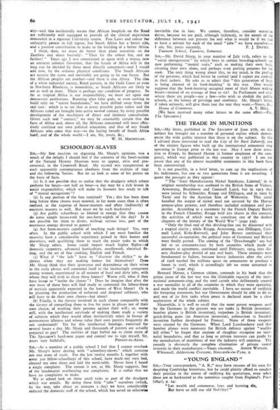SCHOOLBOY-SLAVES
SIR,—My first reaction on digesting Mr. Sharp's opinions was a touch of the delight I should feel if the contents of the fossil-section
of the Natural History Museum were to appear, alive and pro- cessional, in the Cromwell Road. My second was exasperation at such apparently contemptuous aloofness from the realities of 1941 and the following 'forties. But let us look at some of his points on the basis of facts.
(r) Is it not possible that to realise that the drudgery which others perform for hours—not half an hour—a day may be a rich lesson in social responsibility, which will make its learners less ready to talk of " menial occupations "?
(2) Is any portion of the fees remitted? Yes ; this has been done long before these chores were mooted, in far more cases than is often realised, at the expense of house-masters and often (indirectly) of assistant masters as well. But must we be such hucksters?
(3) Are public schoolboys so limited in energy that they cannot do some simple housework for one-forty-eighth of the day? Is it not possible for them to divert, without serious loss, part of the enormous energy devoted to games?
(4) Are form-masters capable of teaching such things? Yes, very often. In the public school with which I am most familiar the majority have a considerable experience gained in their homes and elsewhere, well qualifying them to teach the easier tasks to which Mr Sharp refers. Some could impart much higher flights—of domestic carpentry, advanced horticulture, needlework, electrical fit- ting, and the art of fine cooking, English and French.
(5) What if " the lads " have to " discover the ability " to do chores when they are making homes for themselves? Does Mr. Sharp think that their ignorance and dependence on their wives in the early phases will commend itself to the increasingly competent young women, experienced in all manner of hard and dirty jobs, with whom they will wish to share those homes? Worse still, what if they have learnt to " loathe the chores "? Does he imagine that after the war most of these boys will find ready to command the labour-force of menials apparently expected in the homes of West Meon? Or is be planning the production of enforced and despised celibate's, who still have to do their own chores—but alone?
(6) Finally, is the slavery involved in such chores comparable with the slavery of compelling them to live for years in places not of their own choice, of washing their persons against their will ; or, worse still, with the intellectual servitude of making them study a variety of subjects which they would often instinctively reject in favour of autonomous idleness and whose value their own parents frequently do not understand? Yet for this intellectual bondage, exercised for several hours a day, Mr. Sharp and thousands of parents are actually prepared to pay! The realities of 1941 forbid me to claim more of The Spectator's hard-won paper and compel me to sign myself, Sir,

























 Previous page
Previous page